Leadership and Management for Service Industries: Analysis Report
VerifiedAdded on 2022/11/28
|12
|3963
|405
Report
AI Summary
This report provides a comprehensive analysis of leadership and management within the service industry, focusing on the application of classical management theories like bureaucratic, scientific, behavioral, and human relations theories within a hotel setting (11 Cadogan Gardens Hotel). It explores various leadership styles, including authoritarian, participative, delegative, transactional, and transformational approaches, and their relevance in the service sector. The report further examines the roles and responsibilities of leaders, emphasizing the importance of clear vision and strategic planning. It analyzes administrative and direction manners, considering both internal factors such as mission, leadership, communication, organizational structure, and learning, and external factors like political, social, technological, and economic influences. The report also assesses the impact of these factors on organizational structure and management styles. Finally, it discusses contemporary and future leadership skills required in the service sector, highlighting the need for adaptability and strategic change management.
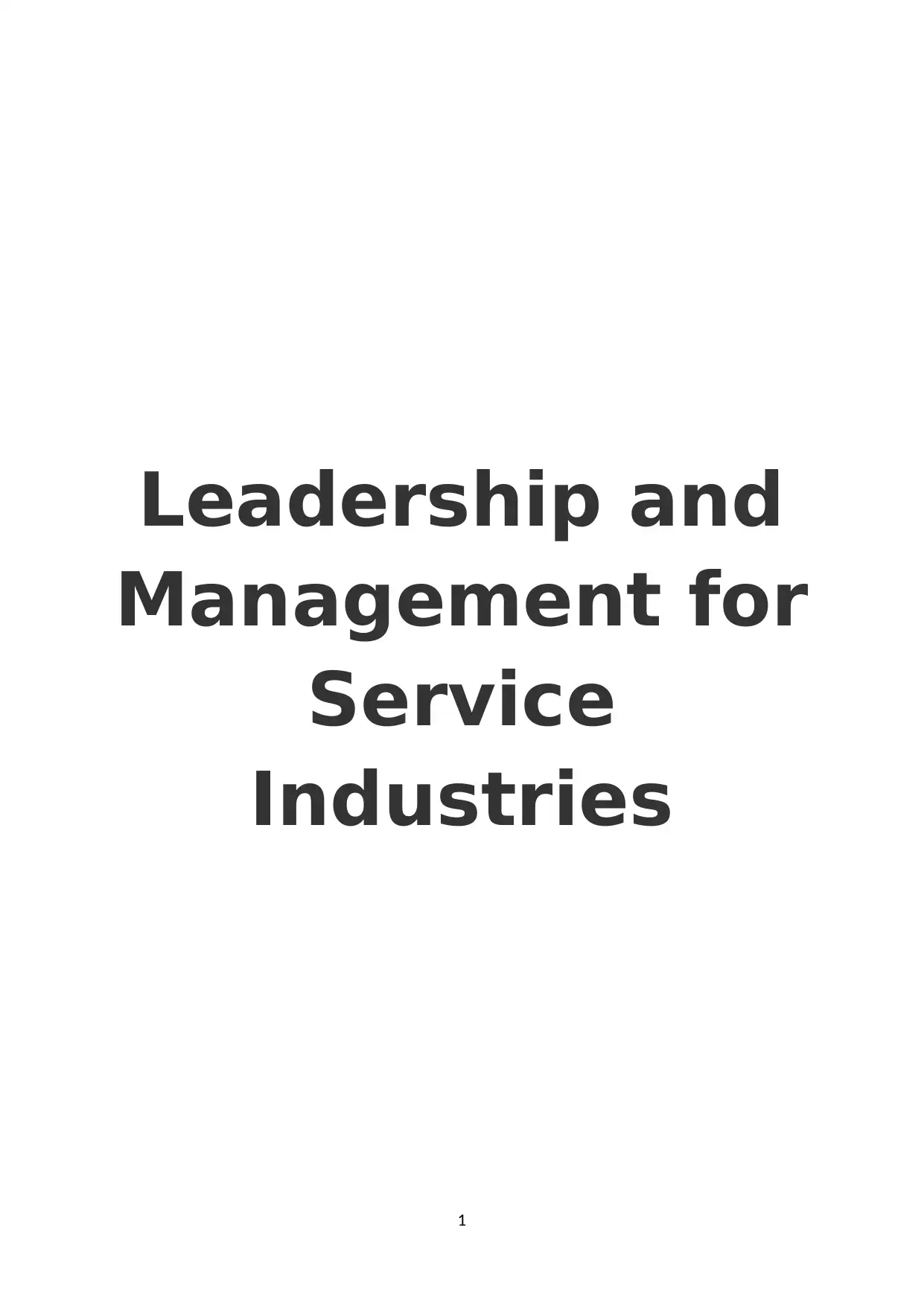
Leadership and
Management for
Service
Industries
1
Management for
Service
Industries
1
Paraphrase This Document
Need a fresh take? Get an instant paraphrase of this document with our AI Paraphraser
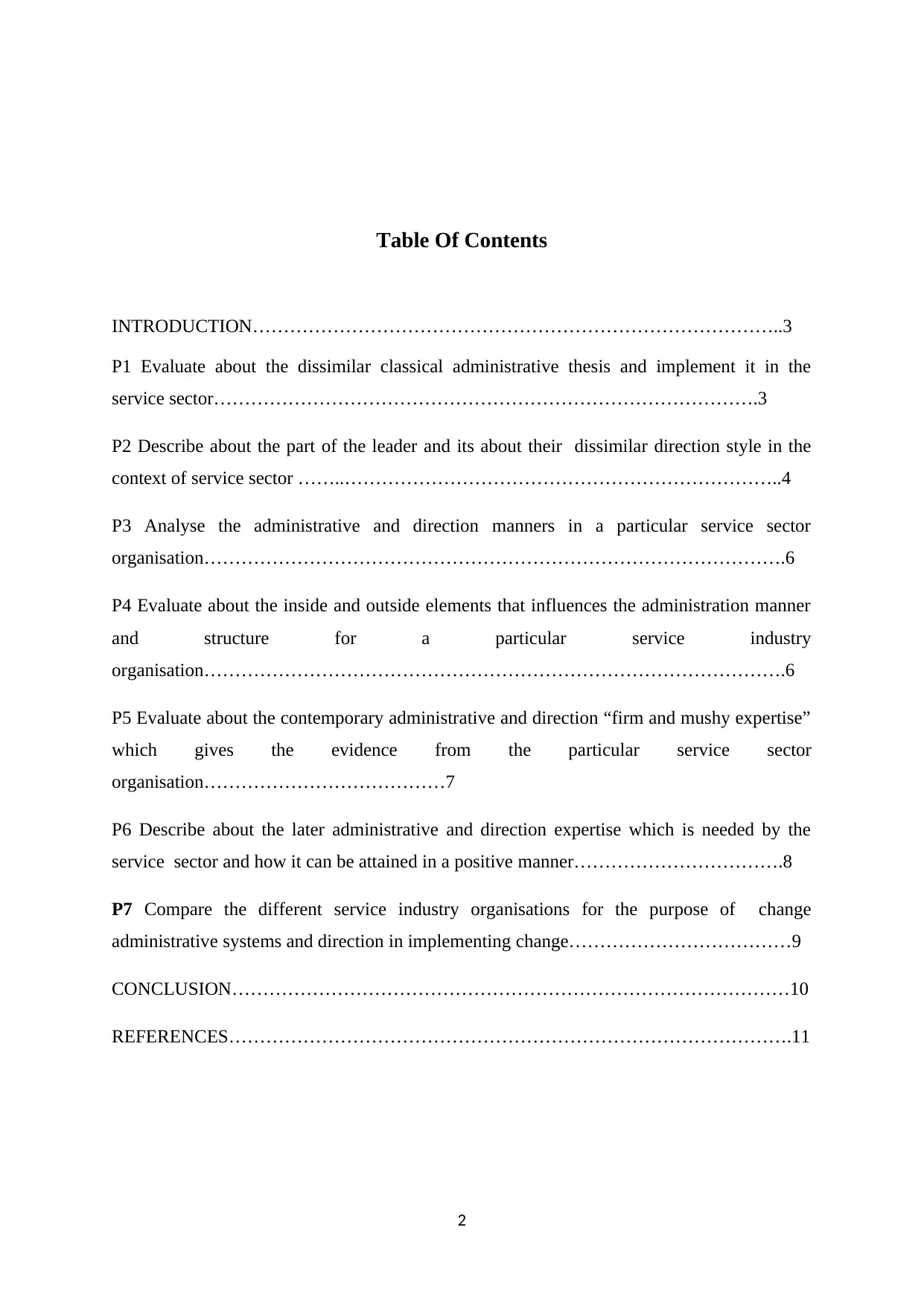
Table Of Contents
INTRODUCTION…………………………………………………………………………..3
P1 Evaluate about the dissimilar classical administrative thesis and implement it in the
service sector…………………………………………………………………………….3
P2 Describe about the part of the leader and its about their dissimilar direction style in the
context of service sector ……..……………………………………………………………..4
P3 Analyse the administrative and direction manners in a particular service sector
organisation………………………………………………………………………………….6
P4 Evaluate about the inside and outside elements that influences the administration manner
and structure for a particular service industry
organisation………………………………………………………………………………….6
P5 Evaluate about the contemporary administrative and direction “firm and mushy expertise”
which gives the evidence from the particular service sector
organisation…………………………………7
P6 Describe about the later administrative and direction expertise which is needed by the
service sector and how it can be attained in a positive manner…………………………….8
P7 Compare the different service industry organisations for the purpose of change
administrative systems and direction in implementing change………………………………9
CONCLUSION………………………………………………………………………………10
REFERENCES……………………………………………………………………………….11
2
INTRODUCTION…………………………………………………………………………..3
P1 Evaluate about the dissimilar classical administrative thesis and implement it in the
service sector…………………………………………………………………………….3
P2 Describe about the part of the leader and its about their dissimilar direction style in the
context of service sector ……..……………………………………………………………..4
P3 Analyse the administrative and direction manners in a particular service sector
organisation………………………………………………………………………………….6
P4 Evaluate about the inside and outside elements that influences the administration manner
and structure for a particular service industry
organisation………………………………………………………………………………….6
P5 Evaluate about the contemporary administrative and direction “firm and mushy expertise”
which gives the evidence from the particular service sector
organisation…………………………………7
P6 Describe about the later administrative and direction expertise which is needed by the
service sector and how it can be attained in a positive manner…………………………….8
P7 Compare the different service industry organisations for the purpose of change
administrative systems and direction in implementing change………………………………9
CONCLUSION………………………………………………………………………………10
REFERENCES……………………………………………………………………………….11
2
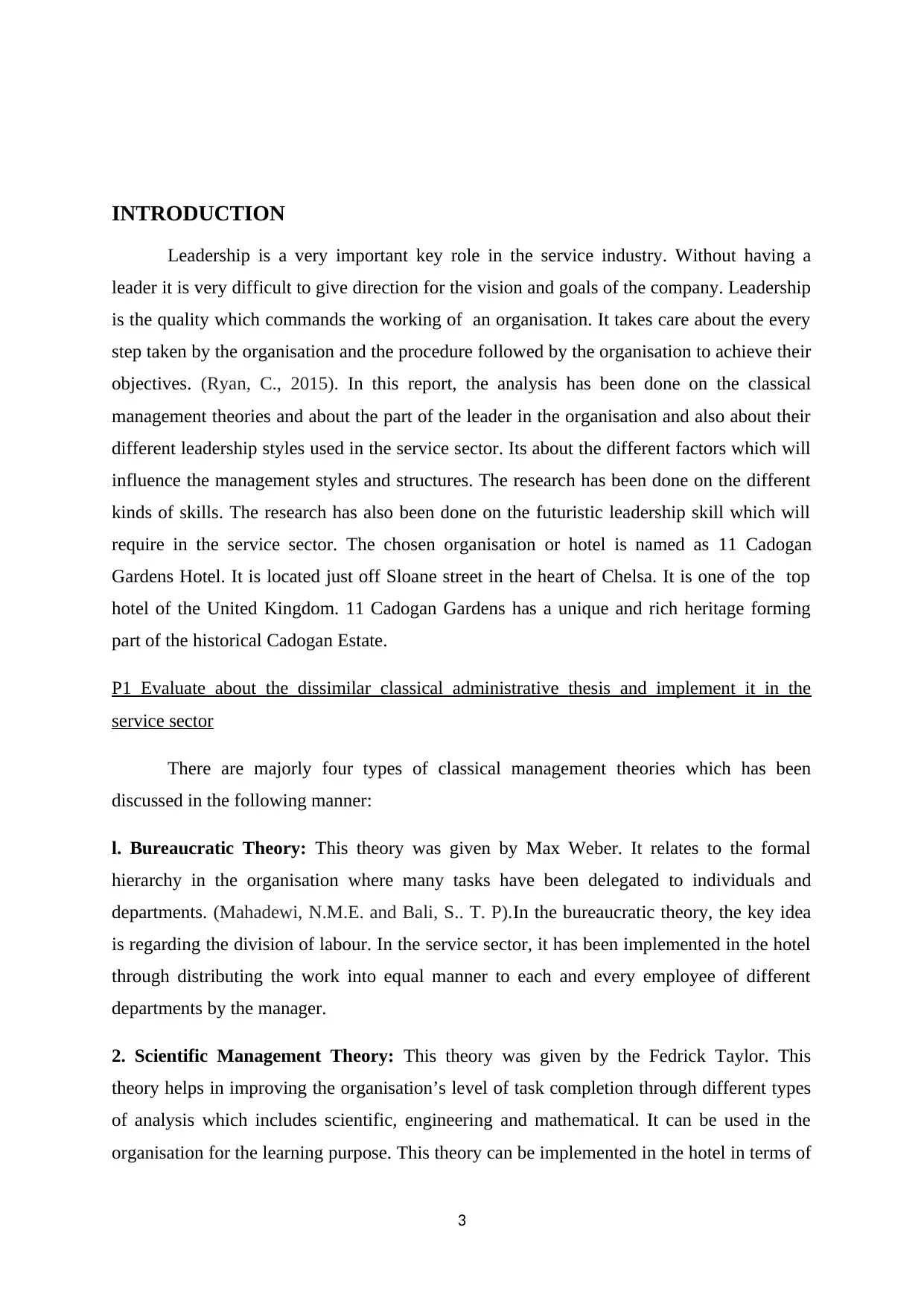
INTRODUCTION
Leadership is a very important key role in the service industry. Without having a
leader it is very difficult to give direction for the vision and goals of the company. Leadership
is the quality which commands the working of an organisation. It takes care about the every
step taken by the organisation and the procedure followed by the organisation to achieve their
objectives. (Ryan, C., 2015). In this report, the analysis has been done on the classical
management theories and about the part of the leader in the organisation and also about their
different leadership styles used in the service sector. Its about the different factors which will
influence the management styles and structures. The research has been done on the different
kinds of skills. The research has also been done on the futuristic leadership skill which will
require in the service sector. The chosen organisation or hotel is named as 11 Cadogan
Gardens Hotel. It is located just off Sloane street in the heart of Chelsa. It is one of the top
hotel of the United Kingdom. 11 Cadogan Gardens has a unique and rich heritage forming
part of the historical Cadogan Estate.
P1 Evaluate about the dissimilar classical administrative thesis and implement it in the
service sector
There are majorly four types of classical management theories which has been
discussed in the following manner:
l. Bureaucratic Theory: This theory was given by Max Weber. It relates to the formal
hierarchy in the organisation where many tasks have been delegated to individuals and
departments. (Mahadewi, N.M.E. and Bali, S.. T. P).In the bureaucratic theory, the key idea
is regarding the division of labour. In the service sector, it has been implemented in the hotel
through distributing the work into equal manner to each and every employee of different
departments by the manager.
2. Scientific Management Theory: This theory was given by the Fedrick Taylor. This
theory helps in improving the organisation’s level of task completion through different types
of analysis which includes scientific, engineering and mathematical. It can be used in the
organisation for the learning purpose. This theory can be implemented in the hotel in terms of
3
Leadership is a very important key role in the service industry. Without having a
leader it is very difficult to give direction for the vision and goals of the company. Leadership
is the quality which commands the working of an organisation. It takes care about the every
step taken by the organisation and the procedure followed by the organisation to achieve their
objectives. (Ryan, C., 2015). In this report, the analysis has been done on the classical
management theories and about the part of the leader in the organisation and also about their
different leadership styles used in the service sector. Its about the different factors which will
influence the management styles and structures. The research has been done on the different
kinds of skills. The research has also been done on the futuristic leadership skill which will
require in the service sector. The chosen organisation or hotel is named as 11 Cadogan
Gardens Hotel. It is located just off Sloane street in the heart of Chelsa. It is one of the top
hotel of the United Kingdom. 11 Cadogan Gardens has a unique and rich heritage forming
part of the historical Cadogan Estate.
P1 Evaluate about the dissimilar classical administrative thesis and implement it in the
service sector
There are majorly four types of classical management theories which has been
discussed in the following manner:
l. Bureaucratic Theory: This theory was given by Max Weber. It relates to the formal
hierarchy in the organisation where many tasks have been delegated to individuals and
departments. (Mahadewi, N.M.E. and Bali, S.. T. P).In the bureaucratic theory, the key idea
is regarding the division of labour. In the service sector, it has been implemented in the hotel
through distributing the work into equal manner to each and every employee of different
departments by the manager.
2. Scientific Management Theory: This theory was given by the Fedrick Taylor. This
theory helps in improving the organisation’s level of task completion through different types
of analysis which includes scientific, engineering and mathematical. It can be used in the
organisation for the learning purpose. This theory can be implemented in the hotel in terms of
3
⊘ This is a preview!⊘
Do you want full access?
Subscribe today to unlock all pages.

Trusted by 1+ million students worldwide
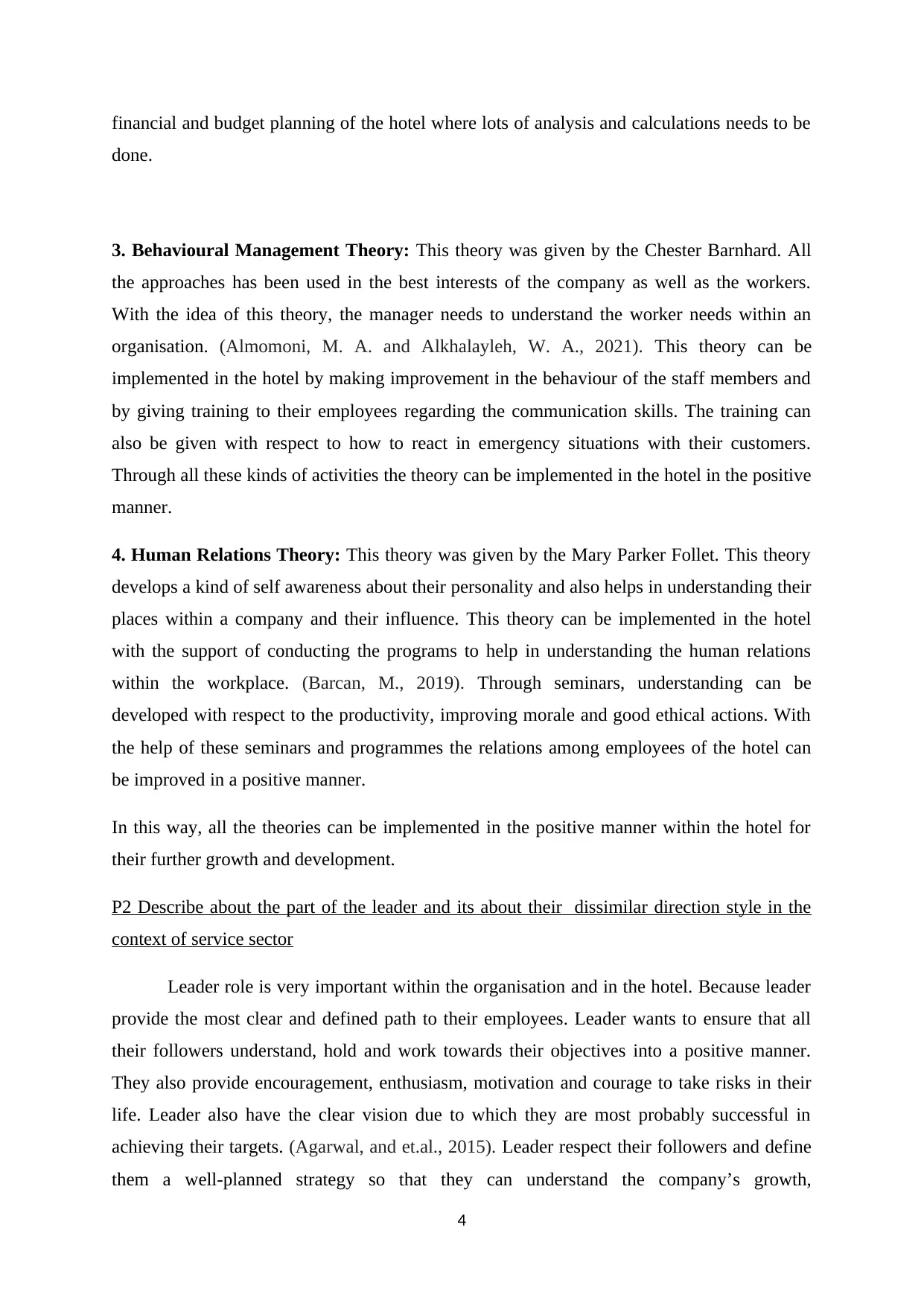
financial and budget planning of the hotel where lots of analysis and calculations needs to be
done.
3. Behavioural Management Theory: This theory was given by the Chester Barnhard. All
the approaches has been used in the best interests of the company as well as the workers.
With the idea of this theory, the manager needs to understand the worker needs within an
organisation. (Almomoni, M. A. and Alkhalayleh, W. A., 2021). This theory can be
implemented in the hotel by making improvement in the behaviour of the staff members and
by giving training to their employees regarding the communication skills. The training can
also be given with respect to how to react in emergency situations with their customers.
Through all these kinds of activities the theory can be implemented in the hotel in the positive
manner.
4. Human Relations Theory: This theory was given by the Mary Parker Follet. This theory
develops a kind of self awareness about their personality and also helps in understanding their
places within a company and their influence. This theory can be implemented in the hotel
with the support of conducting the programs to help in understanding the human relations
within the workplace. (Barcan, M., 2019). Through seminars, understanding can be
developed with respect to the productivity, improving morale and good ethical actions. With
the help of these seminars and programmes the relations among employees of the hotel can
be improved in a positive manner.
In this way, all the theories can be implemented in the positive manner within the hotel for
their further growth and development.
P2 Describe about the part of the leader and its about their dissimilar direction style in the
context of service sector
Leader role is very important within the organisation and in the hotel. Because leader
provide the most clear and defined path to their employees. Leader wants to ensure that all
their followers understand, hold and work towards their objectives into a positive manner.
They also provide encouragement, enthusiasm, motivation and courage to take risks in their
life. Leader also have the clear vision due to which they are most probably successful in
achieving their targets. (Agarwal, and et.al., 2015). Leader respect their followers and define
them a well-planned strategy so that they can understand the company’s growth,
4
done.
3. Behavioural Management Theory: This theory was given by the Chester Barnhard. All
the approaches has been used in the best interests of the company as well as the workers.
With the idea of this theory, the manager needs to understand the worker needs within an
organisation. (Almomoni, M. A. and Alkhalayleh, W. A., 2021). This theory can be
implemented in the hotel by making improvement in the behaviour of the staff members and
by giving training to their employees regarding the communication skills. The training can
also be given with respect to how to react in emergency situations with their customers.
Through all these kinds of activities the theory can be implemented in the hotel in the positive
manner.
4. Human Relations Theory: This theory was given by the Mary Parker Follet. This theory
develops a kind of self awareness about their personality and also helps in understanding their
places within a company and their influence. This theory can be implemented in the hotel
with the support of conducting the programs to help in understanding the human relations
within the workplace. (Barcan, M., 2019). Through seminars, understanding can be
developed with respect to the productivity, improving morale and good ethical actions. With
the help of these seminars and programmes the relations among employees of the hotel can
be improved in a positive manner.
In this way, all the theories can be implemented in the positive manner within the hotel for
their further growth and development.
P2 Describe about the part of the leader and its about their dissimilar direction style in the
context of service sector
Leader role is very important within the organisation and in the hotel. Because leader
provide the most clear and defined path to their employees. Leader wants to ensure that all
their followers understand, hold and work towards their objectives into a positive manner.
They also provide encouragement, enthusiasm, motivation and courage to take risks in their
life. Leader also have the clear vision due to which they are most probably successful in
achieving their targets. (Agarwal, and et.al., 2015). Leader respect their followers and define
them a well-planned strategy so that they can understand the company’s growth,
4
Paraphrase This Document
Need a fresh take? Get an instant paraphrase of this document with our AI Paraphraser
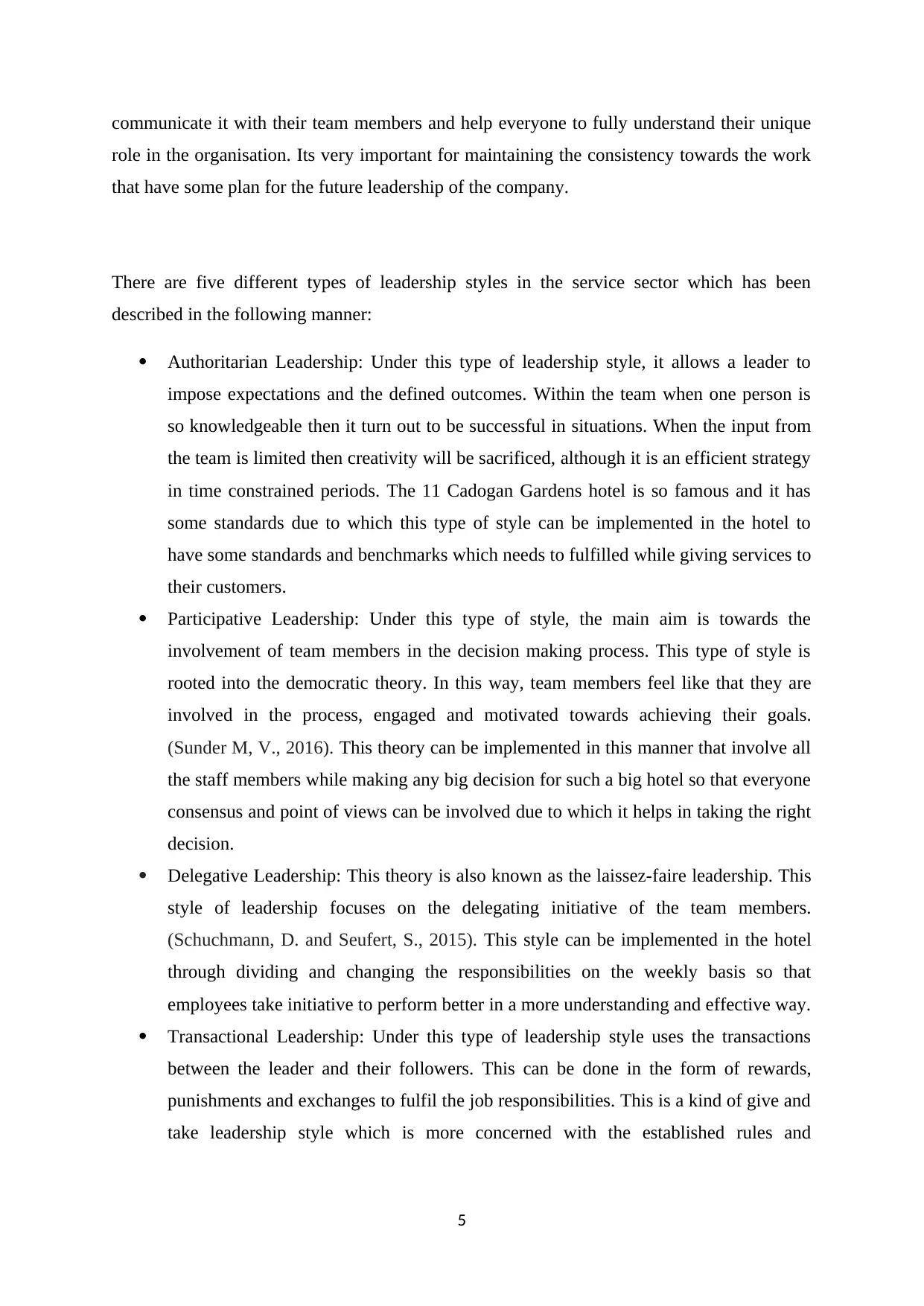
communicate it with their team members and help everyone to fully understand their unique
role in the organisation. Its very important for maintaining the consistency towards the work
that have some plan for the future leadership of the company.
There are five different types of leadership styles in the service sector which has been
described in the following manner:
Authoritarian Leadership: Under this type of leadership style, it allows a leader to
impose expectations and the defined outcomes. Within the team when one person is
so knowledgeable then it turn out to be successful in situations. When the input from
the team is limited then creativity will be sacrificed, although it is an efficient strategy
in time constrained periods. The 11 Cadogan Gardens hotel is so famous and it has
some standards due to which this type of style can be implemented in the hotel to
have some standards and benchmarks which needs to fulfilled while giving services to
their customers.
Participative Leadership: Under this type of style, the main aim is towards the
involvement of team members in the decision making process. This type of style is
rooted into the democratic theory. In this way, team members feel like that they are
involved in the process, engaged and motivated towards achieving their goals.
(Sunder M, V., 2016). This theory can be implemented in this manner that involve all
the staff members while making any big decision for such a big hotel so that everyone
consensus and point of views can be involved due to which it helps in taking the right
decision.
Delegative Leadership: This theory is also known as the laissez-faire leadership. This
style of leadership focuses on the delegating initiative of the team members.
(Schuchmann, D. and Seufert, S., 2015). This style can be implemented in the hotel
through dividing and changing the responsibilities on the weekly basis so that
employees take initiative to perform better in a more understanding and effective way.
Transactional Leadership: Under this type of leadership style uses the transactions
between the leader and their followers. This can be done in the form of rewards,
punishments and exchanges to fulfil the job responsibilities. This is a kind of give and
take leadership style which is more concerned with the established rules and
5
role in the organisation. Its very important for maintaining the consistency towards the work
that have some plan for the future leadership of the company.
There are five different types of leadership styles in the service sector which has been
described in the following manner:
Authoritarian Leadership: Under this type of leadership style, it allows a leader to
impose expectations and the defined outcomes. Within the team when one person is
so knowledgeable then it turn out to be successful in situations. When the input from
the team is limited then creativity will be sacrificed, although it is an efficient strategy
in time constrained periods. The 11 Cadogan Gardens hotel is so famous and it has
some standards due to which this type of style can be implemented in the hotel to
have some standards and benchmarks which needs to fulfilled while giving services to
their customers.
Participative Leadership: Under this type of style, the main aim is towards the
involvement of team members in the decision making process. This type of style is
rooted into the democratic theory. In this way, team members feel like that they are
involved in the process, engaged and motivated towards achieving their goals.
(Sunder M, V., 2016). This theory can be implemented in this manner that involve all
the staff members while making any big decision for such a big hotel so that everyone
consensus and point of views can be involved due to which it helps in taking the right
decision.
Delegative Leadership: This theory is also known as the laissez-faire leadership. This
style of leadership focuses on the delegating initiative of the team members.
(Schuchmann, D. and Seufert, S., 2015). This style can be implemented in the hotel
through dividing and changing the responsibilities on the weekly basis so that
employees take initiative to perform better in a more understanding and effective way.
Transactional Leadership: Under this type of leadership style uses the transactions
between the leader and their followers. This can be done in the form of rewards,
punishments and exchanges to fulfil the job responsibilities. This is a kind of give and
take leadership style which is more concerned with the established rules and
5
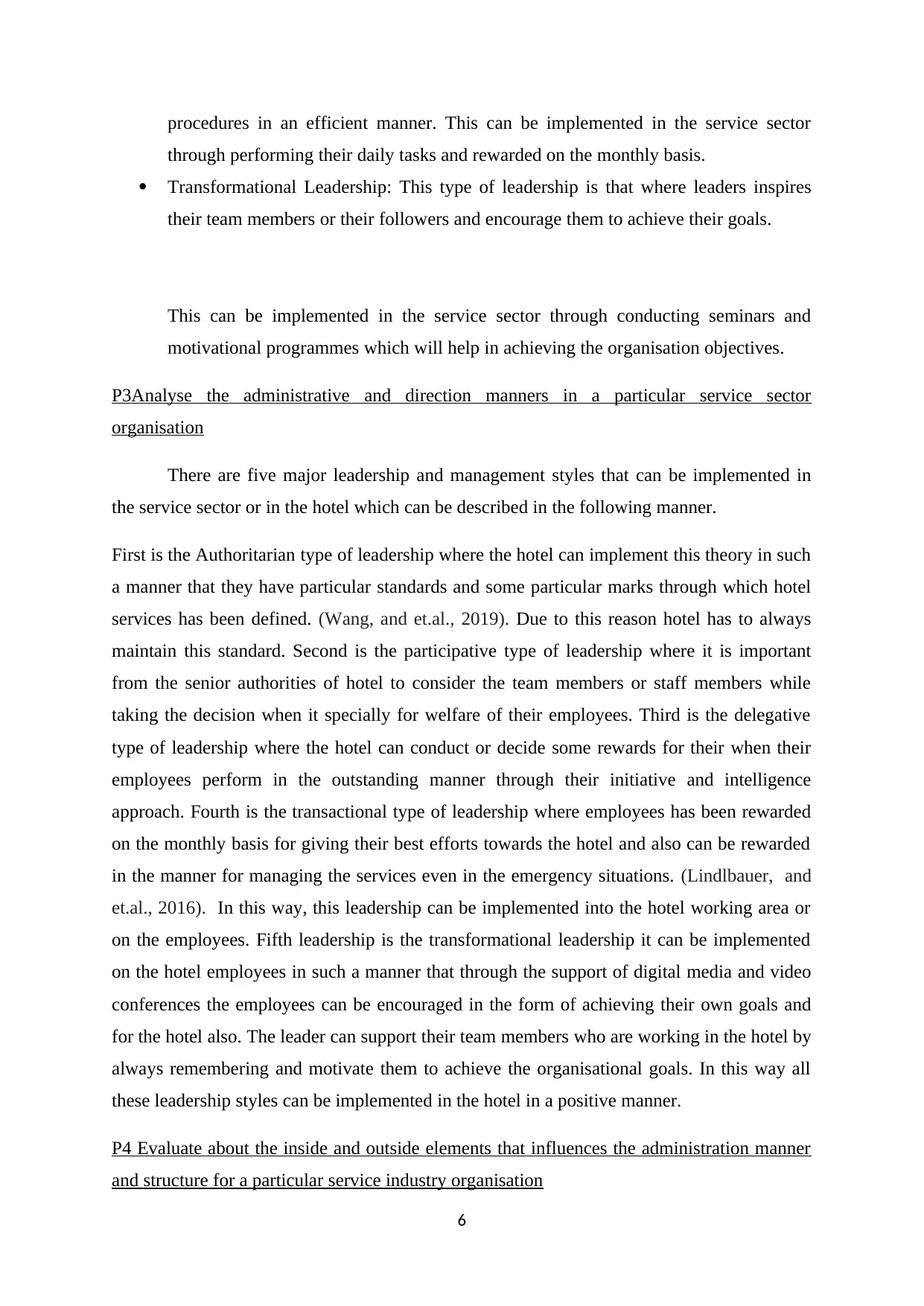
procedures in an efficient manner. This can be implemented in the service sector
through performing their daily tasks and rewarded on the monthly basis.
Transformational Leadership: This type of leadership is that where leaders inspires
their team members or their followers and encourage them to achieve their goals.
This can be implemented in the service sector through conducting seminars and
motivational programmes which will help in achieving the organisation objectives.
P3Analyse the administrative and direction manners in a particular service sector
organisation
There are five major leadership and management styles that can be implemented in
the service sector or in the hotel which can be described in the following manner.
First is the Authoritarian type of leadership where the hotel can implement this theory in such
a manner that they have particular standards and some particular marks through which hotel
services has been defined. (Wang, and et.al., 2019). Due to this reason hotel has to always
maintain this standard. Second is the participative type of leadership where it is important
from the senior authorities of hotel to consider the team members or staff members while
taking the decision when it specially for welfare of their employees. Third is the delegative
type of leadership where the hotel can conduct or decide some rewards for their when their
employees perform in the outstanding manner through their initiative and intelligence
approach. Fourth is the transactional type of leadership where employees has been rewarded
on the monthly basis for giving their best efforts towards the hotel and also can be rewarded
in the manner for managing the services even in the emergency situations. (Lindlbauer, and
et.al., 2016). In this way, this leadership can be implemented into the hotel working area or
on the employees. Fifth leadership is the transformational leadership it can be implemented
on the hotel employees in such a manner that through the support of digital media and video
conferences the employees can be encouraged in the form of achieving their own goals and
for the hotel also. The leader can support their team members who are working in the hotel by
always remembering and motivate them to achieve the organisational goals. In this way all
these leadership styles can be implemented in the hotel in a positive manner.
P4 Evaluate about the inside and outside elements that influences the administration manner
and structure for a particular service industry organisation
6
through performing their daily tasks and rewarded on the monthly basis.
Transformational Leadership: This type of leadership is that where leaders inspires
their team members or their followers and encourage them to achieve their goals.
This can be implemented in the service sector through conducting seminars and
motivational programmes which will help in achieving the organisation objectives.
P3Analyse the administrative and direction manners in a particular service sector
organisation
There are five major leadership and management styles that can be implemented in
the service sector or in the hotel which can be described in the following manner.
First is the Authoritarian type of leadership where the hotel can implement this theory in such
a manner that they have particular standards and some particular marks through which hotel
services has been defined. (Wang, and et.al., 2019). Due to this reason hotel has to always
maintain this standard. Second is the participative type of leadership where it is important
from the senior authorities of hotel to consider the team members or staff members while
taking the decision when it specially for welfare of their employees. Third is the delegative
type of leadership where the hotel can conduct or decide some rewards for their when their
employees perform in the outstanding manner through their initiative and intelligence
approach. Fourth is the transactional type of leadership where employees has been rewarded
on the monthly basis for giving their best efforts towards the hotel and also can be rewarded
in the manner for managing the services even in the emergency situations. (Lindlbauer, and
et.al., 2016). In this way, this leadership can be implemented into the hotel working area or
on the employees. Fifth leadership is the transformational leadership it can be implemented
on the hotel employees in such a manner that through the support of digital media and video
conferences the employees can be encouraged in the form of achieving their own goals and
for the hotel also. The leader can support their team members who are working in the hotel by
always remembering and motivate them to achieve the organisational goals. In this way all
these leadership styles can be implemented in the hotel in a positive manner.
P4 Evaluate about the inside and outside elements that influences the administration manner
and structure for a particular service industry organisation
6
⊘ This is a preview!⊘
Do you want full access?
Subscribe today to unlock all pages.

Trusted by 1+ million students worldwide
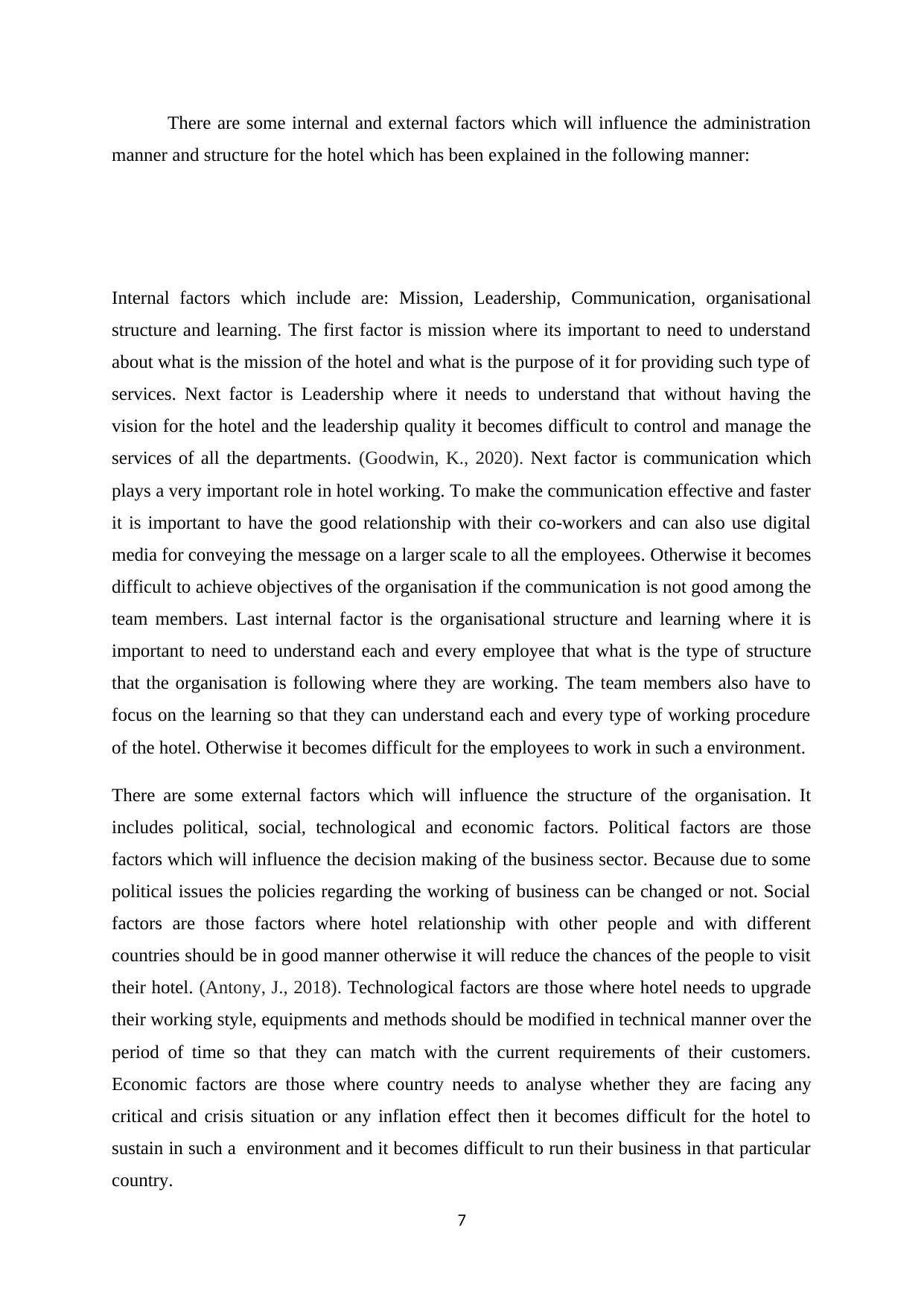
There are some internal and external factors which will influence the administration
manner and structure for the hotel which has been explained in the following manner:
Internal factors which include are: Mission, Leadership, Communication, organisational
structure and learning. The first factor is mission where its important to need to understand
about what is the mission of the hotel and what is the purpose of it for providing such type of
services. Next factor is Leadership where it needs to understand that without having the
vision for the hotel and the leadership quality it becomes difficult to control and manage the
services of all the departments. (Goodwin, K., 2020). Next factor is communication which
plays a very important role in hotel working. To make the communication effective and faster
it is important to have the good relationship with their co-workers and can also use digital
media for conveying the message on a larger scale to all the employees. Otherwise it becomes
difficult to achieve objectives of the organisation if the communication is not good among the
team members. Last internal factor is the organisational structure and learning where it is
important to need to understand each and every employee that what is the type of structure
that the organisation is following where they are working. The team members also have to
focus on the learning so that they can understand each and every type of working procedure
of the hotel. Otherwise it becomes difficult for the employees to work in such a environment.
There are some external factors which will influence the structure of the organisation. It
includes political, social, technological and economic factors. Political factors are those
factors which will influence the decision making of the business sector. Because due to some
political issues the policies regarding the working of business can be changed or not. Social
factors are those factors where hotel relationship with other people and with different
countries should be in good manner otherwise it will reduce the chances of the people to visit
their hotel. (Antony, J., 2018). Technological factors are those where hotel needs to upgrade
their working style, equipments and methods should be modified in technical manner over the
period of time so that they can match with the current requirements of their customers.
Economic factors are those where country needs to analyse whether they are facing any
critical and crisis situation or any inflation effect then it becomes difficult for the hotel to
sustain in such a environment and it becomes difficult to run their business in that particular
country.
7
manner and structure for the hotel which has been explained in the following manner:
Internal factors which include are: Mission, Leadership, Communication, organisational
structure and learning. The first factor is mission where its important to need to understand
about what is the mission of the hotel and what is the purpose of it for providing such type of
services. Next factor is Leadership where it needs to understand that without having the
vision for the hotel and the leadership quality it becomes difficult to control and manage the
services of all the departments. (Goodwin, K., 2020). Next factor is communication which
plays a very important role in hotel working. To make the communication effective and faster
it is important to have the good relationship with their co-workers and can also use digital
media for conveying the message on a larger scale to all the employees. Otherwise it becomes
difficult to achieve objectives of the organisation if the communication is not good among the
team members. Last internal factor is the organisational structure and learning where it is
important to need to understand each and every employee that what is the type of structure
that the organisation is following where they are working. The team members also have to
focus on the learning so that they can understand each and every type of working procedure
of the hotel. Otherwise it becomes difficult for the employees to work in such a environment.
There are some external factors which will influence the structure of the organisation. It
includes political, social, technological and economic factors. Political factors are those
factors which will influence the decision making of the business sector. Because due to some
political issues the policies regarding the working of business can be changed or not. Social
factors are those factors where hotel relationship with other people and with different
countries should be in good manner otherwise it will reduce the chances of the people to visit
their hotel. (Antony, J., 2018). Technological factors are those where hotel needs to upgrade
their working style, equipments and methods should be modified in technical manner over the
period of time so that they can match with the current requirements of their customers.
Economic factors are those where country needs to analyse whether they are facing any
critical and crisis situation or any inflation effect then it becomes difficult for the hotel to
sustain in such a environment and it becomes difficult to run their business in that particular
country.
7
Paraphrase This Document
Need a fresh take? Get an instant paraphrase of this document with our AI Paraphraser
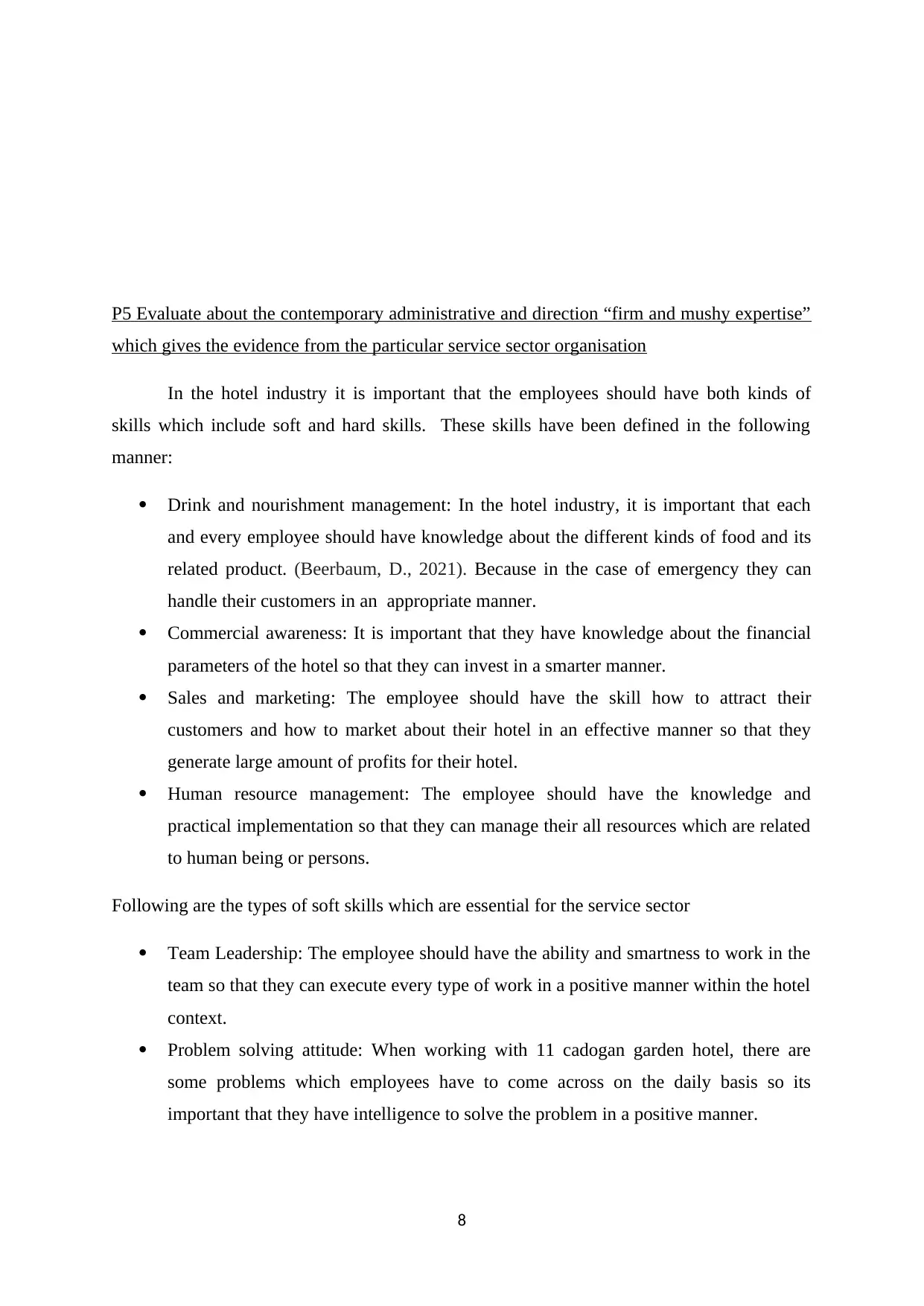
P5 Evaluate about the contemporary administrative and direction “firm and mushy expertise”
which gives the evidence from the particular service sector organisation
In the hotel industry it is important that the employees should have both kinds of
skills which include soft and hard skills. These skills have been defined in the following
manner:
Drink and nourishment management: In the hotel industry, it is important that each
and every employee should have knowledge about the different kinds of food and its
related product. (Beerbaum, D., 2021). Because in the case of emergency they can
handle their customers in an appropriate manner.
Commercial awareness: It is important that they have knowledge about the financial
parameters of the hotel so that they can invest in a smarter manner.
Sales and marketing: The employee should have the skill how to attract their
customers and how to market about their hotel in an effective manner so that they
generate large amount of profits for their hotel.
Human resource management: The employee should have the knowledge and
practical implementation so that they can manage their all resources which are related
to human being or persons.
Following are the types of soft skills which are essential for the service sector
Team Leadership: The employee should have the ability and smartness to work in the
team so that they can execute every type of work in a positive manner within the hotel
context.
Problem solving attitude: When working with 11 cadogan garden hotel, there are
some problems which employees have to come across on the daily basis so its
important that they have intelligence to solve the problem in a positive manner.
8
which gives the evidence from the particular service sector organisation
In the hotel industry it is important that the employees should have both kinds of
skills which include soft and hard skills. These skills have been defined in the following
manner:
Drink and nourishment management: In the hotel industry, it is important that each
and every employee should have knowledge about the different kinds of food and its
related product. (Beerbaum, D., 2021). Because in the case of emergency they can
handle their customers in an appropriate manner.
Commercial awareness: It is important that they have knowledge about the financial
parameters of the hotel so that they can invest in a smarter manner.
Sales and marketing: The employee should have the skill how to attract their
customers and how to market about their hotel in an effective manner so that they
generate large amount of profits for their hotel.
Human resource management: The employee should have the knowledge and
practical implementation so that they can manage their all resources which are related
to human being or persons.
Following are the types of soft skills which are essential for the service sector
Team Leadership: The employee should have the ability and smartness to work in the
team so that they can execute every type of work in a positive manner within the hotel
context.
Problem solving attitude: When working with 11 cadogan garden hotel, there are
some problems which employees have to come across on the daily basis so its
important that they have intelligence to solve the problem in a positive manner.
8
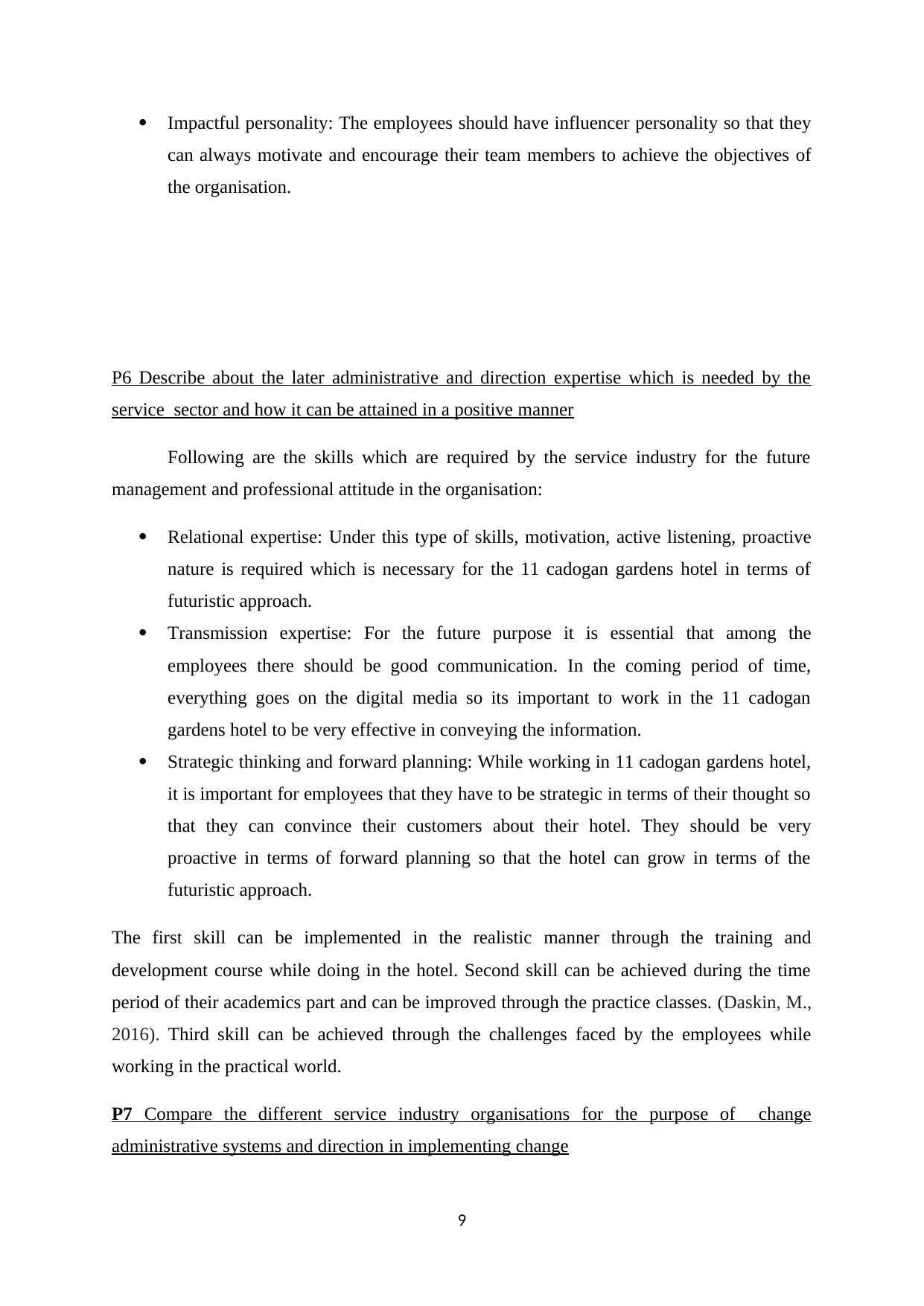
Impactful personality: The employees should have influencer personality so that they
can always motivate and encourage their team members to achieve the objectives of
the organisation.
P6 Describe about the later administrative and direction expertise which is needed by the
service sector and how it can be attained in a positive manner
Following are the skills which are required by the service industry for the future
management and professional attitude in the organisation:
Relational expertise: Under this type of skills, motivation, active listening, proactive
nature is required which is necessary for the 11 cadogan gardens hotel in terms of
futuristic approach.
Transmission expertise: For the future purpose it is essential that among the
employees there should be good communication. In the coming period of time,
everything goes on the digital media so its important to work in the 11 cadogan
gardens hotel to be very effective in conveying the information.
Strategic thinking and forward planning: While working in 11 cadogan gardens hotel,
it is important for employees that they have to be strategic in terms of their thought so
that they can convince their customers about their hotel. They should be very
proactive in terms of forward planning so that the hotel can grow in terms of the
futuristic approach.
The first skill can be implemented in the realistic manner through the training and
development course while doing in the hotel. Second skill can be achieved during the time
period of their academics part and can be improved through the practice classes. (Daskin, M.,
2016). Third skill can be achieved through the challenges faced by the employees while
working in the practical world.
P7 Compare the different service industry organisations for the purpose of change
administrative systems and direction in implementing change
9
can always motivate and encourage their team members to achieve the objectives of
the organisation.
P6 Describe about the later administrative and direction expertise which is needed by the
service sector and how it can be attained in a positive manner
Following are the skills which are required by the service industry for the future
management and professional attitude in the organisation:
Relational expertise: Under this type of skills, motivation, active listening, proactive
nature is required which is necessary for the 11 cadogan gardens hotel in terms of
futuristic approach.
Transmission expertise: For the future purpose it is essential that among the
employees there should be good communication. In the coming period of time,
everything goes on the digital media so its important to work in the 11 cadogan
gardens hotel to be very effective in conveying the information.
Strategic thinking and forward planning: While working in 11 cadogan gardens hotel,
it is important for employees that they have to be strategic in terms of their thought so
that they can convince their customers about their hotel. They should be very
proactive in terms of forward planning so that the hotel can grow in terms of the
futuristic approach.
The first skill can be implemented in the realistic manner through the training and
development course while doing in the hotel. Second skill can be achieved during the time
period of their academics part and can be improved through the practice classes. (Daskin, M.,
2016). Third skill can be achieved through the challenges faced by the employees while
working in the practical world.
P7 Compare the different service industry organisations for the purpose of change
administrative systems and direction in implementing change
9
⊘ This is a preview!⊘
Do you want full access?
Subscribe today to unlock all pages.

Trusted by 1+ million students worldwide
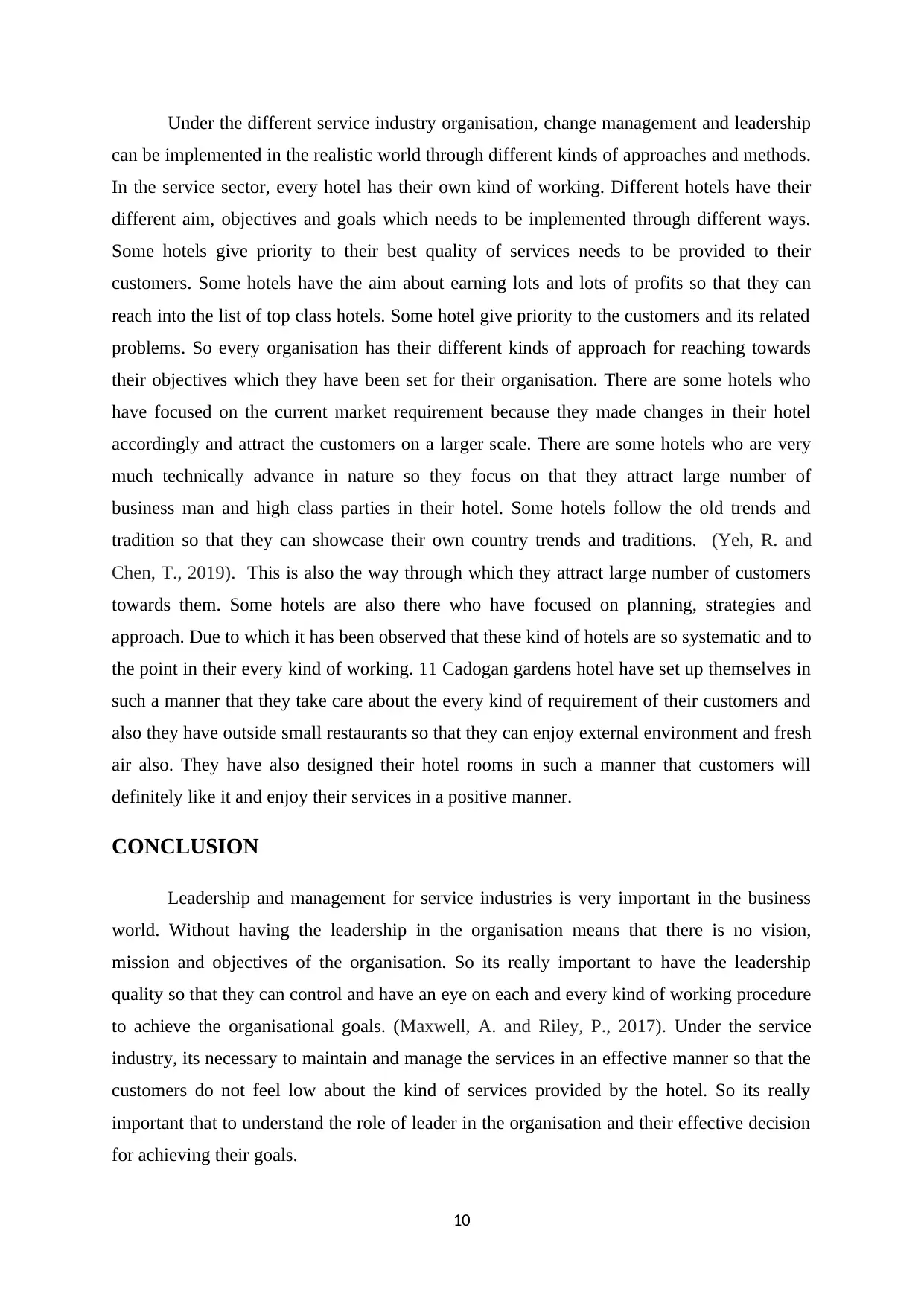
Under the different service industry organisation, change management and leadership
can be implemented in the realistic world through different kinds of approaches and methods.
In the service sector, every hotel has their own kind of working. Different hotels have their
different aim, objectives and goals which needs to be implemented through different ways.
Some hotels give priority to their best quality of services needs to be provided to their
customers. Some hotels have the aim about earning lots and lots of profits so that they can
reach into the list of top class hotels. Some hotel give priority to the customers and its related
problems. So every organisation has their different kinds of approach for reaching towards
their objectives which they have been set for their organisation. There are some hotels who
have focused on the current market requirement because they made changes in their hotel
accordingly and attract the customers on a larger scale. There are some hotels who are very
much technically advance in nature so they focus on that they attract large number of
business man and high class parties in their hotel. Some hotels follow the old trends and
tradition so that they can showcase their own country trends and traditions. (Yeh, R. and
Chen, T., 2019). This is also the way through which they attract large number of customers
towards them. Some hotels are also there who have focused on planning, strategies and
approach. Due to which it has been observed that these kind of hotels are so systematic and to
the point in their every kind of working. 11 Cadogan gardens hotel have set up themselves in
such a manner that they take care about the every kind of requirement of their customers and
also they have outside small restaurants so that they can enjoy external environment and fresh
air also. They have also designed their hotel rooms in such a manner that customers will
definitely like it and enjoy their services in a positive manner.
CONCLUSION
Leadership and management for service industries is very important in the business
world. Without having the leadership in the organisation means that there is no vision,
mission and objectives of the organisation. So its really important to have the leadership
quality so that they can control and have an eye on each and every kind of working procedure
to achieve the organisational goals. (Maxwell, A. and Riley, P., 2017). Under the service
industry, its necessary to maintain and manage the services in an effective manner so that the
customers do not feel low about the kind of services provided by the hotel. So its really
important that to understand the role of leader in the organisation and their effective decision
for achieving their goals.
10
can be implemented in the realistic world through different kinds of approaches and methods.
In the service sector, every hotel has their own kind of working. Different hotels have their
different aim, objectives and goals which needs to be implemented through different ways.
Some hotels give priority to their best quality of services needs to be provided to their
customers. Some hotels have the aim about earning lots and lots of profits so that they can
reach into the list of top class hotels. Some hotel give priority to the customers and its related
problems. So every organisation has their different kinds of approach for reaching towards
their objectives which they have been set for their organisation. There are some hotels who
have focused on the current market requirement because they made changes in their hotel
accordingly and attract the customers on a larger scale. There are some hotels who are very
much technically advance in nature so they focus on that they attract large number of
business man and high class parties in their hotel. Some hotels follow the old trends and
tradition so that they can showcase their own country trends and traditions. (Yeh, R. and
Chen, T., 2019). This is also the way through which they attract large number of customers
towards them. Some hotels are also there who have focused on planning, strategies and
approach. Due to which it has been observed that these kind of hotels are so systematic and to
the point in their every kind of working. 11 Cadogan gardens hotel have set up themselves in
such a manner that they take care about the every kind of requirement of their customers and
also they have outside small restaurants so that they can enjoy external environment and fresh
air also. They have also designed their hotel rooms in such a manner that customers will
definitely like it and enjoy their services in a positive manner.
CONCLUSION
Leadership and management for service industries is very important in the business
world. Without having the leadership in the organisation means that there is no vision,
mission and objectives of the organisation. So its really important to have the leadership
quality so that they can control and have an eye on each and every kind of working procedure
to achieve the organisational goals. (Maxwell, A. and Riley, P., 2017). Under the service
industry, its necessary to maintain and manage the services in an effective manner so that the
customers do not feel low about the kind of services provided by the hotel. So its really
important that to understand the role of leader in the organisation and their effective decision
for achieving their goals.
10
Paraphrase This Document
Need a fresh take? Get an instant paraphrase of this document with our AI Paraphraser
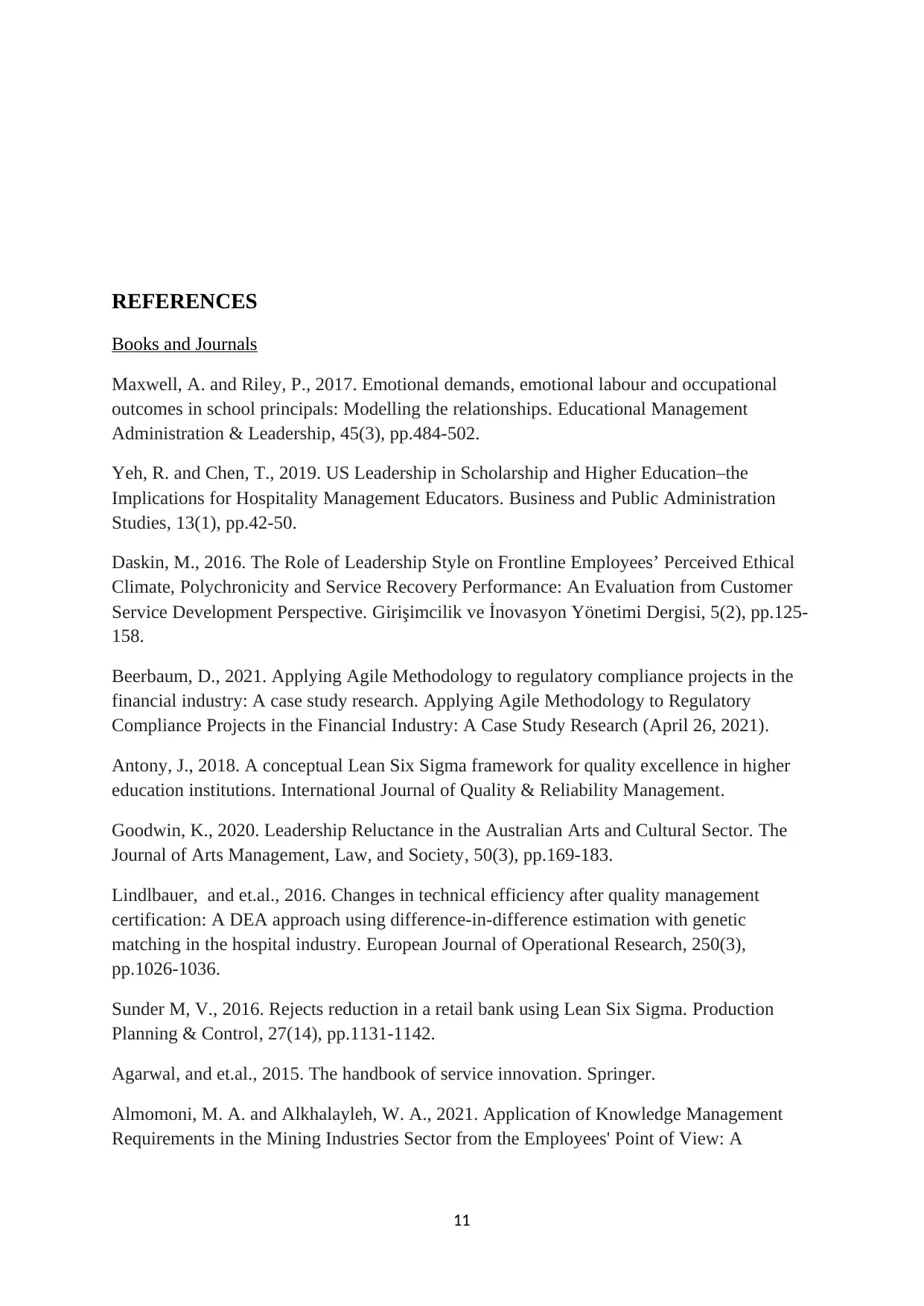
REFERENCES
Books and Journals
Maxwell, A. and Riley, P., 2017. Emotional demands, emotional labour and occupational
outcomes in school principals: Modelling the relationships. Educational Management
Administration & Leadership, 45(3), pp.484-502.
Yeh, R. and Chen, T., 2019. US Leadership in Scholarship and Higher Education–the
Implications for Hospitality Management Educators. Business and Public Administration
Studies, 13(1), pp.42-50.
Daskin, M., 2016. The Role of Leadership Style on Frontline Employees’ Perceived Ethical
Climate, Polychronicity and Service Recovery Performance: An Evaluation from Customer
Service Development Perspective. Girişimcilik ve İnovasyon Yönetimi Dergisi, 5(2), pp.125-
158.
Beerbaum, D., 2021. Applying Agile Methodology to regulatory compliance projects in the
financial industry: A case study research. Applying Agile Methodology to Regulatory
Compliance Projects in the Financial Industry: A Case Study Research (April 26, 2021).
Antony, J., 2018. A conceptual Lean Six Sigma framework for quality excellence in higher
education institutions. International Journal of Quality & Reliability Management.
Goodwin, K., 2020. Leadership Reluctance in the Australian Arts and Cultural Sector. The
Journal of Arts Management, Law, and Society, 50(3), pp.169-183.
Lindlbauer, and et.al., 2016. Changes in technical efficiency after quality management
certification: A DEA approach using difference-in-difference estimation with genetic
matching in the hospital industry. European Journal of Operational Research, 250(3),
pp.1026-1036.
Sunder M, V., 2016. Rejects reduction in a retail bank using Lean Six Sigma. Production
Planning & Control, 27(14), pp.1131-1142.
Agarwal, and et.al., 2015. The handbook of service innovation. Springer.
Almomoni, M. A. and Alkhalayleh, W. A., 2021. Application of Knowledge Management
Requirements in the Mining Industries Sector from the Employees' Point of View: A
11
Books and Journals
Maxwell, A. and Riley, P., 2017. Emotional demands, emotional labour and occupational
outcomes in school principals: Modelling the relationships. Educational Management
Administration & Leadership, 45(3), pp.484-502.
Yeh, R. and Chen, T., 2019. US Leadership in Scholarship and Higher Education–the
Implications for Hospitality Management Educators. Business and Public Administration
Studies, 13(1), pp.42-50.
Daskin, M., 2016. The Role of Leadership Style on Frontline Employees’ Perceived Ethical
Climate, Polychronicity and Service Recovery Performance: An Evaluation from Customer
Service Development Perspective. Girişimcilik ve İnovasyon Yönetimi Dergisi, 5(2), pp.125-
158.
Beerbaum, D., 2021. Applying Agile Methodology to regulatory compliance projects in the
financial industry: A case study research. Applying Agile Methodology to Regulatory
Compliance Projects in the Financial Industry: A Case Study Research (April 26, 2021).
Antony, J., 2018. A conceptual Lean Six Sigma framework for quality excellence in higher
education institutions. International Journal of Quality & Reliability Management.
Goodwin, K., 2020. Leadership Reluctance in the Australian Arts and Cultural Sector. The
Journal of Arts Management, Law, and Society, 50(3), pp.169-183.
Lindlbauer, and et.al., 2016. Changes in technical efficiency after quality management
certification: A DEA approach using difference-in-difference estimation with genetic
matching in the hospital industry. European Journal of Operational Research, 250(3),
pp.1026-1036.
Sunder M, V., 2016. Rejects reduction in a retail bank using Lean Six Sigma. Production
Planning & Control, 27(14), pp.1131-1142.
Agarwal, and et.al., 2015. The handbook of service innovation. Springer.
Almomoni, M. A. and Alkhalayleh, W. A., 2021. Application of Knowledge Management
Requirements in the Mining Industries Sector from the Employees' Point of View: A
11
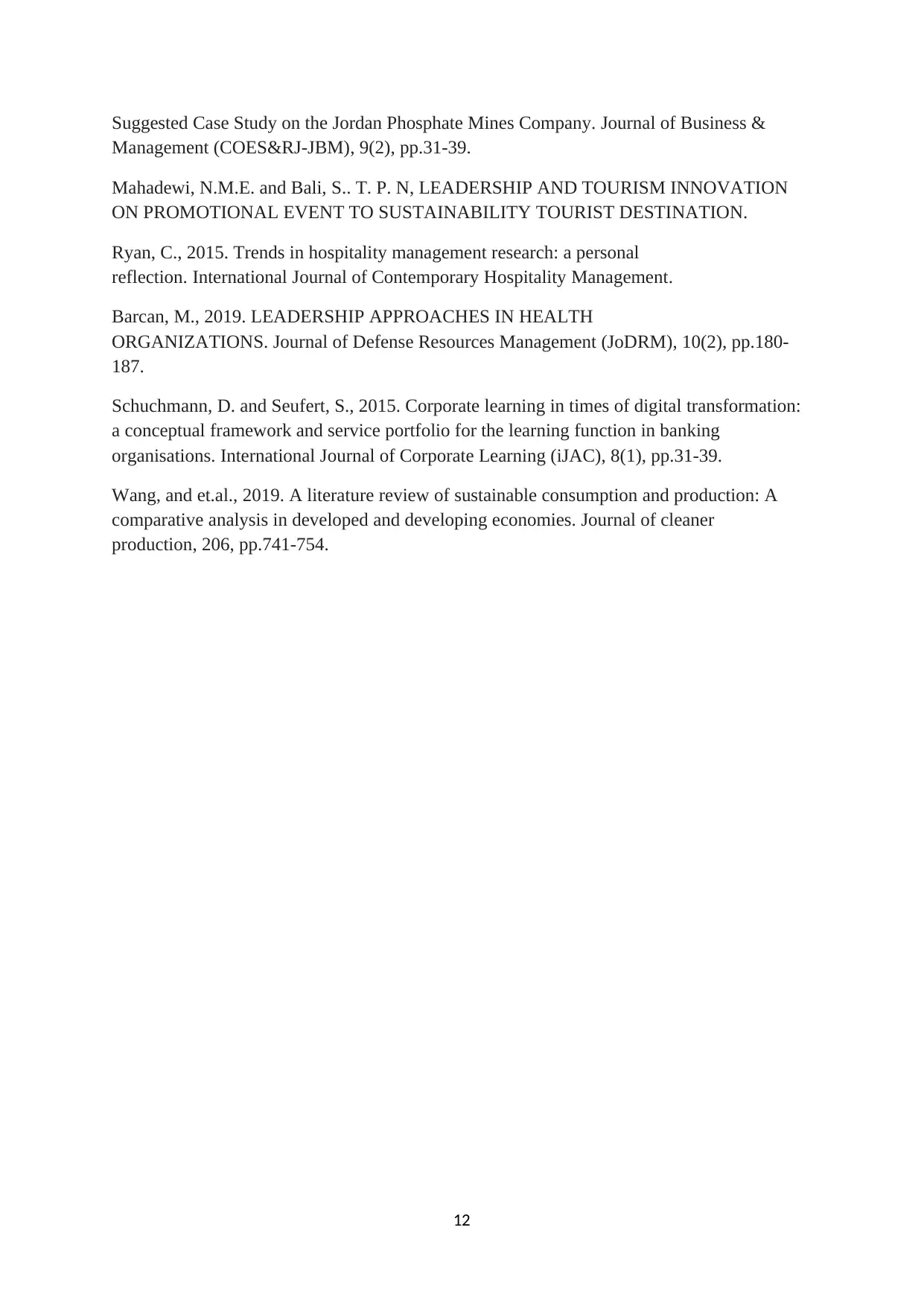
Suggested Case Study on the Jordan Phosphate Mines Company. Journal of Business &
Management (COES&RJ-JBM), 9(2), pp.31-39.
Mahadewi, N.M.E. and Bali, S.. T. P. N, LEADERSHIP AND TOURISM INNOVATION
ON PROMOTIONAL EVENT TO SUSTAINABILITY TOURIST DESTINATION.
Ryan, C., 2015. Trends in hospitality management research: a personal
reflection. International Journal of Contemporary Hospitality Management.
Barcan, M., 2019. LEADERSHIP APPROACHES IN HEALTH
ORGANIZATIONS. Journal of Defense Resources Management (JoDRM), 10(2), pp.180-
187.
Schuchmann, D. and Seufert, S., 2015. Corporate learning in times of digital transformation:
a conceptual framework and service portfolio for the learning function in banking
organisations. International Journal of Corporate Learning (iJAC), 8(1), pp.31-39.
Wang, and et.al., 2019. A literature review of sustainable consumption and production: A
comparative analysis in developed and developing economies. Journal of cleaner
production, 206, pp.741-754.
12
Management (COES&RJ-JBM), 9(2), pp.31-39.
Mahadewi, N.M.E. and Bali, S.. T. P. N, LEADERSHIP AND TOURISM INNOVATION
ON PROMOTIONAL EVENT TO SUSTAINABILITY TOURIST DESTINATION.
Ryan, C., 2015. Trends in hospitality management research: a personal
reflection. International Journal of Contemporary Hospitality Management.
Barcan, M., 2019. LEADERSHIP APPROACHES IN HEALTH
ORGANIZATIONS. Journal of Defense Resources Management (JoDRM), 10(2), pp.180-
187.
Schuchmann, D. and Seufert, S., 2015. Corporate learning in times of digital transformation:
a conceptual framework and service portfolio for the learning function in banking
organisations. International Journal of Corporate Learning (iJAC), 8(1), pp.31-39.
Wang, and et.al., 2019. A literature review of sustainable consumption and production: A
comparative analysis in developed and developing economies. Journal of cleaner
production, 206, pp.741-754.
12
⊘ This is a preview!⊘
Do you want full access?
Subscribe today to unlock all pages.

Trusted by 1+ million students worldwide
1 out of 12
Related Documents
Your All-in-One AI-Powered Toolkit for Academic Success.
+13062052269
info@desklib.com
Available 24*7 on WhatsApp / Email
![[object Object]](/_next/static/media/star-bottom.7253800d.svg)
Unlock your academic potential
Copyright © 2020–2026 A2Z Services. All Rights Reserved. Developed and managed by ZUCOL.





